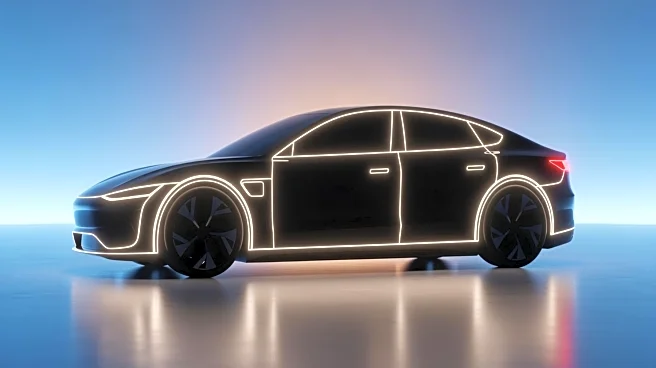What's Happening?
Tesla has introduced more affordable versions of its Model Y and Model 3 electric vehicles. These new variants are stripped-back versions of the existing models, designed to lower the starting cost and make
Tesla ownership more accessible. The Model Y Standard Rear-Wheel Drive starts at $39,990, offering an EPA-estimated range of 321 miles and a peak charging rate of 225 kW. It features a 69 kWh battery and produces about 300 horsepower. The Model 3 Standard Rear-Wheel Drive is priced at $36,990, sharing similar specifications with the Model Y. Both models have reduced features, such as manual adjustments for seats and mirrors, and lack some luxury elements like heated rear seats and Autosteer. Tesla aims to attract first-time EV buyers by focusing on affordability while maintaining its core strengths in software and driving dynamics.
Why It's Important?
The introduction of more affordable Tesla models is significant as it addresses the growing demand for cost-effective electric vehicles. With the average price of new vehicles in the U.S. being high, these models offer a more accessible entry point for consumers interested in EVs. This move could potentially increase Tesla's market share and drive broader adoption of electric vehicles, contributing to the shift towards sustainable transportation. By offering long-range, fast-charging vehicles at lower prices, Tesla is positioned to compete with other manufacturers targeting budget-conscious consumers.
What's Next?
Tesla's strategy to offer affordable electric vehicles may prompt other automakers to reevaluate their pricing structures and product offerings. As the EV market continues to expand, competition is likely to intensify, leading to innovations and improvements in vehicle technology and infrastructure. Tesla's focus on affordability could also influence public policy and incentives related to electric vehicle adoption, potentially accelerating the transition to cleaner transportation options.
Beyond the Headlines
Tesla's decision to reduce features in its new models highlights a shift in consumer priorities towards practicality and cost-effectiveness over luxury. This trend may influence broader industry practices, encouraging manufacturers to prioritize essential features and efficiency. Additionally, Tesla's approach could impact the perception of electric vehicles, making them more appealing to a wider audience and fostering a cultural shift towards sustainable living.









